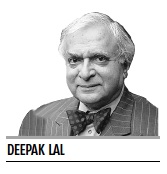 We need a national survey of the incidence of coronavirus by testing a representative sample of population, not lockdowns
We need a national survey of the incidence of coronavirus by testing a representative sample of population, not lockdowns
by Deepak Lal
My wife and I were scheduled to fly out from London on March 14 to Delhi for our usual stay at our Delhi home in the spring. Unfortunately, the Delhi airport was shut because of fears about foreign travellers bringing coronavirus into India. Since then we have been marooned in London waiting for the airport to open. Meanwhile, given the rise of coronavirus cases in London (and the UK) and the threat they pose to the National Health Service (NHS) with its inadequacies to cope with the need for ICU’s and respirators by the aged likely to be infected by the coronavirus, after various procrastinations aimed to keep the country at least partially open, Prime Minister Boris Johnson was forced by the advice of his medical advisers to order a lockdown of the country from the weekend. With the aged most at risk undertaking social distancing, including self- isolation for those with some respiratory problems, we are in effective house arrest till the airports open and allow us to fly to Delhi.
This pandemic, which began in China like the bird flu, Sars and swine flu pandemics, has infected and killed large numbers globally to date. As the lockdowns in the UK, US and Europe effectively put their economies in an induced coma, governments have been forced to undertake massive public intervention to deal with the liquidity crisis this “sudden stop” entails for businesses and workers. They have loosened monetary policies, and undertaken massive fiscal expansions. The UK is about to pass the most draconian laws restricting civil liberties to enforce the lockdowns.
Is all this necessary? It is claimed by the UK government in daily press conferences that all they are doing is following the best medical epidemiological advice to save the elderly and the NHS. But is this credible when at the start of the crisis these same epidemiologists were advising that the best course was to let the virus rip till over 60 per cent of the population were infected creating “herd immunity”? One of the epidemiologists, Professor Neil Ferguson of Imperial College London, produced a model showing this would lead to half a million fatalities. If instead the virus was suppressed through social distancing and lockdowns, the number of fatalities could be kept down to 20,000 — not much larger than the annual fatalities from flu.
Not all epidemiologists agree. Professor John Ioannidis of Stanford University argues that there is not enough evidence on which to base draconian policies like lockdowns. “Three months after the outbreak emerged, most countries including the US lack the ability to test a large number of people and no country has reliable data on the prevalence of the virus in a representative random sample of the general population” (“A fiasco in the making? As the coronavirus pandemic takes hold, we are making decisions without reliable data”, (emphasis added). (www.statnews.com/2020/03/17)
Ioannidis then applies the test data from the Diamond Princess cruise ship and its quarantine passengers to the age structure of the US population, and making various plausible assumptions about various uncertainties, to estimate the likely fatalities from the coronavirus in the US. He concludes “reasonable estimates for the case fatality ratio in the general US population vary from 0.05 per cent (lower than the seasonal flu) to 1 per cent.” If this is true, “locking down the world with tremendous social and financial consequences may be totally irrational. It’s like an elephant being attacked by a house cat. Frustrated and trying to avoid the cat, the elephant accidentally jumps of a cliff and dies”.
Marc Lipsitch of Harvard demurs. Whilst agreeing with Ioannides that US test data is needed, he reiterates the conclusions of the Imperial College study by asserting that “we know enough to act decisively against COVID-19. Social distancing is a good place to start”. (www.statnews.com/2020/03/18). I am not persuaded.
The World Health Organization’s top emergency expert Mike Ryan has stated that lockdowns cannot defeat coronavirus which will resurface when the lockdowns end. What is needed is to focus “on finding those who have the virus, and isolate them, find their contacts and isolate them”. One small town in Veneto in the heart of the Italian epidemic has shown in a pilot study how mass testing can eliminate the virus. On March 6, all 3,000 inhabitants of Vos — including those with no symptoms — were tested. This allowed people to be quarantined “before they showed signs of infection and stop the further spread of coronavirus. In this way we eradicated coronavirus in under 14 days” (Andrea Cristani and Antonio Cassone in “In one Italian town we showed mass testing could eradicate the coronavirus.” The Guardian, March 20 ) Hence, the WHO’s current slogan : “Test, test, test”.
Singapore, South Korea, Hong Kong and Taiwan have all used testing, tracing and tracking to control the spread of coronavirus, whilst still maintaining some semi-normality with schools and businesses still open. “Test, trace and track: How Singapore is winning the war”. Daily Telegraph, March, 23)
For India, attempting to follow the UK’s lockdown model would be a mistake, particularly as it would require a draconian police state, and without evidence of who is infected and on the transmission mechanism to follow the “Singapore model” would seem to be a Herculean task. Except for the fact that India’s NSS was a pioneering institution collecting the needed microeconomic data from its sample surveys which informed public policy. Though it has fallen on hard times like most bureaucratic institutions in India, there remains the survey unit of the National Council of Economic Research, which when I worked with it in the late 1990s would meet the bill, not least because it hired recent graduates for the term to conduct its various sample surveys. It should be hired to do a national survey of the incidence of coronavirus by testing a representative sample of the Indian population. With this as a base, there is a need to produce quick and easy testing kits, which would allow the coronavirus to be stopped in its tracks, without the need for socially and economically disruptive lockdowns, as shown in Vos, Hong Kong, Singapore, Taiwan and South Korea.
Read the original article here…
Deepak Lal is the James S. Coleman Professor Emeritus of International Development Studies at the University of California at Los Angeles, professor emeritus of political economy at University College London, and a senior fellow at the Cato Institute. He was a member of the Indian Foreign Service (1963-66) and has served as a consultant to the Indian Planning Commission, the World Bank, the Organization for Economic Cooperation and Development, various UN agencies, South Korea, and Sri Lanka. From 1984 to 1987 he was research administrator at the World Bank. Lal is the author of a number of books, including The Poverty of Development Economics; The Hindu Equilibrium; Against Dirigisme; The Political Economy of Poverty, Equity and Growth; Unintended Consequences: The Impact of Factor Endowments, Culture, and Politics on Long-Run Economic Performance; and Reviving the Invisible Hand: The Case for Classical Liberalism in the 21st Century.


